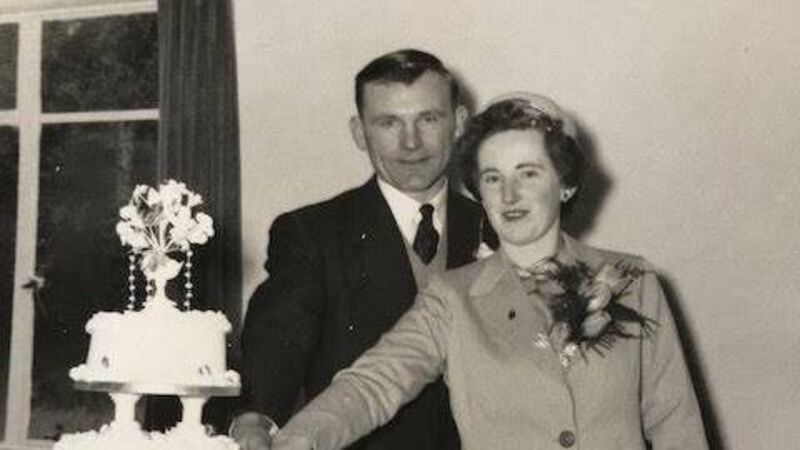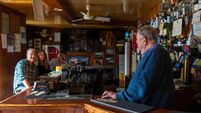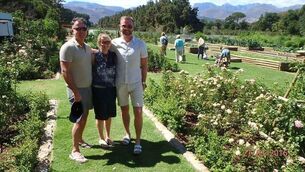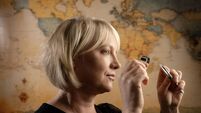Mum told all eight of us she loved us, then died

BEFORE she died of Motor Neurone Disease, Brid O’Connor called all eight of her children to her bedside. She wanted to tell them all how much she loved them one final time.
That was in January, 2005, and all these years on, her husband, Tony, and children are still going to great efforts to raise money for the Irish Motor Neurone Association.
A few weeks ago, Brid’s beloved husband Tom ‘married’ again in a mock wedding at the Fir Grove Hotel in Mitchelstown and raised in excess of €125,000 for the fund.
“Mam would be so proud,” says Bernie, one of those eight children, as she remembers her mum with Mother’s Day looming this Sunday.
It was love at first sight when Tom O’Connor, of Bauravilla, near Dunmanway, spotted Brid Cronin at a World Ploughing Match in Killarney in 1954.
“She was on the back of a motorbike and he fell in love with her long red curls,” says Bernie. “Her red hair dazzled him.
“When he spotted her, he said; that’s my lady.
“A cousin of dad’s traced her and they got married in Gougane Barra within 18 months of meeting each other.”
It was a match made in heaven.
“Mam and dad were never apart,” says Bernie. “Dad was dealt a very severe blow with the loss of his beloved wife.
“They worked on the farm together, and went out together hand in hand. Mam drove dad everywhere and she looked after all the bills.
“She ruined him. When they went out for a drink after mass on a Sunday night, mam gave dad the money to buy the drinks, because that was a man’s job.”

Brid was a hard grafter and a homemaker.
“Our house was an open house,” says Bernie. “Mam could have five or 15 people for dinner. It was like the loaves and fishes.
“There was always home-baking and scrumptious brown bread to eat.
“Granny lived with us for a while. She was bed-bound and she used to keep sweets in her trunk and doled them out to us.”
Tom, now 89, loved his family and he loved the land.
“We moved to the Golden Vale in Tipperary when I was five,” says Bernie, who is a mum herself now, to Sally, 17, and Jack, 18.
“Mam and dad loved West Cork and we went back there often. All the grandchildren have an affinity with West Cork.”
Brid was a tough West Cork woman.
“She was only 5 feet three inches,” says Bernie. “She carried two five-gallon drums of milk from the milking parlour in home, from here to the end of the car park,” she adds, pointing from the reception of the Fir Grove Hotel out to the road. “Mam was tough.”
But then, slowly but surely, she started to weaken.
“Her strength seemed to sap,” says Bernie. “She got more feeble. We didn’t know the reason why.
“One doctor thought it may be Parkinson’s and that she was depressed. But Mam never got depressed. She was so happy. Herself and my father never had an argument.”
But all was not well.
“She got quieter in herself,” adds Bernie.
“My brother took her to London for a consultation, where it was suggested she see a neurologist. Her swallow was affected.”
“She wanted to be in top form for my sister Breda’s wedding. She wanted to see her married and settled. Mam lost weight and the doctor told her to keep her weight up. She used to put coins in her pocket to weigh more.”
Brid didn’t want to be ill for her daughter’s wedding.
“But she was sick. We could see that,” says Bernie. “Mam was a great woman to hide it. But she went downhill. When she went to hospital in Tralee, her condition still wasn’t diagnosed.
“I remember, coming up to that Christmas, all that was bothering her was getting fresh herbs for the stuffing for the turkey.
“Mam reared turkeys all her life. When she was ill in bed, all she wanted to do was get up and get the turkeys ready.”
Brid had another reason to rally.
“The lads were back from the UK,” says Bernie, adding: “But mam had no energy. It broke my heart.”
Tom knew his wife was gravely ill. Dr Richard Quirke confirmed his worst fears.
“He sent her to Beaumont Hospital. She got a garda escort. We all followed in our cars behind. Dr Hardiman confirmed that mam had Motor Neurone Disease on New Year’s Eve. The doctor said it could be weeks or months.

“We said to her; promise you won’t die. She passed away on January 19, 2005. We all took her death very hard. Dad was like a lost puppy.”
Tom was bereft for the woman with the fiery red hair that he fell in love with.
“Five years before she was diagnosed, she was slowing down,” says Tom. “We had never heard of Motor Neurone Disease.
“And she became more silent at times. I tried to cheer her up with a squeeze and a kiss. She’d look around and say, what if someone sees us? I told her it was all right. We had a licence!”
Brid, the determined lady that she was, decided she wanted to come home to be near her husband Tom, and their children, Pat, Tim, Tom, Mary, Norma, Breda, Bernadette and Derry, like she always was.
“Thomas, one of her golden boys, brought her home from hospital,” says Bernie. “The love mam had for her children was unbelievable.”
Brid kept her promise to her children. She made it home before she died.
“When she came down the dip near our house, she said ‘home’,” says Bernie. “Her voice had gone, but she said ‘home’ clearly and she called all of us all to her by name and she told us that she loved us. We all had an hour with her. She died happy.”
And Tom was happy to be involved in keeping his wife’s memory alive.
“Dad is a real character,” says Bernie. “Yes, he got lonely after Mam passed away, but he had all of us round him.”
And he was needed.
“We said, we have no mam now. We need you,” says Bernie. “The realisation that he was needed perked him up.”
And he got that twinkle in his eye back again.
“He did,” says Bernie, laughing.
Tom was the proud groom at the 'Wedding of the Year' in aid of the Irish Motor Neurone Disease Association.
“It was the single biggest and best event that we have ever hosted,” says Pat Tangney, owner of the Fir Grove Hotel, Mitchelstown. “350 people sat down for dinner. It was a novel idea, a fabulous one.”
“Who was the lucky lady?
Bernie smiles.
“Eileen Boland is a good friend of ours. Sadly, she lost her husband, Charlie, to Motor Neurone disease in 2003. Eileen works tirelessly raising much-needed funds for the association.”
Bernie continues to raise funds for the disease that claimed her beloved mother.
“Yes, we’re always doing something,” she says. “We’ve had head shaves, coffee mornings and afternoon tea is a great fund-raiser for the association.
“The mock wedding topped everything though. The occasion was done with respect and dignity. Everyone wanted to be at it. It probably brought back memories of his own day when he married mam in 1956.”
Bernie always thinks of her dear mam.
“She had a strong voice,” says Bernie. “I can still hear it, the nicest sound in all the world.
“And she had her own scent, that special scent only your mother has. You know? I kept a scarf belonging to her and I can smell her scent from it.
“Mammies are so important.”
Dads are too. “Dad is brilliant,” agrees Bernie. “He has a mighty spirit. He says it is better wearing out instead of rusting out!”
Tom will always love his red-haired girl.
Did the gene continue?
“Some of the grandchildren inherited Mam’s red hair,” says Bernie with a smile.
“Grandad Tom, as he is known now, is proud of all his family.”
ABOUT MOTOR NEURONE DISEASE
Motor Neurone Disease (MND), is a condition that is progressive, incurable and terminal. It affects everyone differently and the majority of people who suffer from it die within the first 1,000 days of being diagnosed.
IMNDA cannot slow down the progression of MND or change the outcome, but they can help alleviate the feelings of isolation and improve the quality of life. They can provide much needed daily care, arrange home visits and help supply badly needed specialist medical and home care equipment. Part of the money raised goes towards providing counselling and funding key research in the condition which is desperately needed.
Freephone helpline: 1800 403 403
Email: service@imnda.ie







 App?
App?


